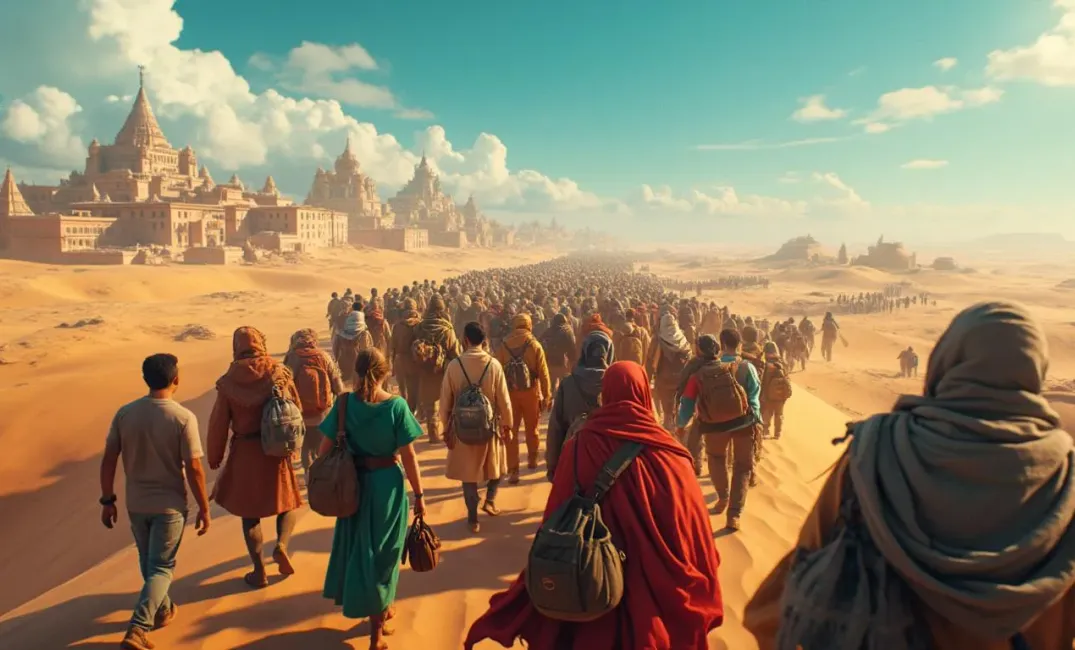Introduction: The Endless Human Journey
"Human beings are the only creatures who invest such a monumental effort in journeys across landscapes—both physical and metaphysical—seeking their elusive horizons." — Unknown
Human migration is one of the most significant themes in history—an unending journey that reshapes societies through exploration, relocation, and innovation. From early wanderers leaving Africa to modern global migration phenomena, movement is a testament to human adaptability and resilience.
This exploration delves into the patterns of human migration and its profound impact on cultures, economies, and global connections. By understanding these journeys, we gain insights into how migration has been a narrative of survival, growth, and reshaping civilizations throughout time.
The Dawn of Human Mobility: Early Migrations
The Primal Exodus from Africa
- Out of Africa Hypothesis: Modern human migration began with the exodus from Africa. Evidence suggests that Homo sapiens began migrating around 60,000 to 80,000 years ago, traversing vast terrains in search of new ecosystems and resources.
- Tools and Adaptations: As early humans dispersed, they developed varied tool sets and honed survival skills, thriving in diverse environments from tropics to tundras, establishing the foundations of human geographical diversity.
Peopling the Continents
- Into Eurasia and Beyond: Successive migrations led humans into Eurasia, Australia, and the Americas. Ice ages influenced migration routes, with land bridges like Beringia facilitating the peopling of the Americas.
- Cultural Diffusion and Variation: Migration led to exchange of ideas, technologies, and cultural practices, resulting in significant cultural variation, development of diverse languages, beliefs, and art forms that still enrich human experience today.
Ancient and Classical Migrations
The Age of Nomadic Tribes
- Pastoralists and Nomads: Nomadic tribes such as the Mongols exemplify adaptive migration patterns driven by ecological conditions, facilitating widespread cultural and technological exchange.
- Trade Routes as Conduits: Routes like the Silk Road functioned as migration arteries, fostering intercultural contacts that enriched civilizations.
Slave Migrations and Forced Movements
- Ancient Slave Trades: Civilizations often expanded through forced migrations, with slavery playing a prominent role. Empires like Rome depended on enslaved peoples for labor, affecting cultural and genetic exchanges.
- Diasporas and Identity Formation: The Jewish diaspora and African slave trade affected cultural identities, creating unique cultural syntheses as displaced populations adapted to new environments.
The Middle Ages to Early Modern Period
The Rise of Empires and Conquests
- Expansionist Paradigms: Empires like the Ottomans facilitated migrations through conquests, leading to integration of diverse peoples.
- Cultural Syncretism: Conquering empires led to cultural syncretism, blending indigenous traditions with those of colonizers.
The Age of Exploration
- Navigational Revolutions: Advances in navigation led to transoceanic migrations. Explorers reached the Americas, Africa, and Asia, driven by religious, economic, and political motives.
- Colonial Legacies: Colonization disrupted indigenous ways of life, introducing new cultural elements and triggering global migrations that reshaped demographics.
Modern Migration: The Long Twentieth Century
Industrialization and Urbanization
- Rural to Urban Movement: The Industrial Revolution catalyzed migrations to urban centers for employment, altering social structures.
- Migrant Labor and Economic Transformation: Migrant labor shaped economic landscapes through contributions to manufacturing, agriculture, and construction.
Wars and Political Upheavals
- Conflict-Induced Displacements: Wars and political turmoil led to displacement, altering national borders and identities.
- International Refugee Movements: Conflicts like the World Wars resulted in refugee movements that reshaped cultural and political dynamics.
Contemporary Migration Patterns
Globalization and Mobility
- Transnational Networks: Globalization facilitates migration flows through networks, enabling people to maintain cultural ties across settings.
- Diaspora Communities: Diaspora communities foster economic linkages and contribute to multiculturalism in host societies.
Climate Change and Migratory Pressures
- Environmental Migrants: Climate change drives migration as individuals seek refuge from natural disasters and deteriorating living conditions.
- Adaptation and Resilience: International policies focused on adaptation and equitable resource distribution are needed to address challenges of environmentally induced migration.
The Future of Migration: Challenges and Opportunities
Navigating Human Rights and Policy
- Promoting Humanitarian Policies: Ensuring fair migration policies while safeguarding human rights is a global imperative.
- Cross-Border Cooperation: Collaborative efforts are crucial to addressing migration challenges and harnessing benefits through understanding and integration.
Migration as a Driver of Innovation
- Cultural Exchange and Enrichment: Migration catalyzes cultural exchange and innovation, introducing new perspectives and invigorating host societies.
- Addressing Talent Mobility: Policies that support skill development and capitalize on migrants' contributions are essential.
Conclusion: Migration as Humanity's Ongoing Odyssey
"Everywhere immigrants have enriched and strengthened the fabric of American life." — John F. Kennedy
Migration is the ever-unfolding story of humanity—a tale of aspirations and challenges. Societies continuously reshape identities, landscapes, and connections through migration.
Harnessing the potential of migration will require wisdom and cooperation. By acknowledging migration's historic narrative, humanity can plan an inclusive journey for tomorrow—contributing to the rich tapestry of discovery and interconnectedness in our shared history.
SOCIETIES, ENVIRONMENT, INNOVATION, CULTURAL EXCHANGE, HUMAN HISTORY, DIASPORA, POLICY, GLOBALIZATION, HUMAN RIGHTS, MIGRATION

